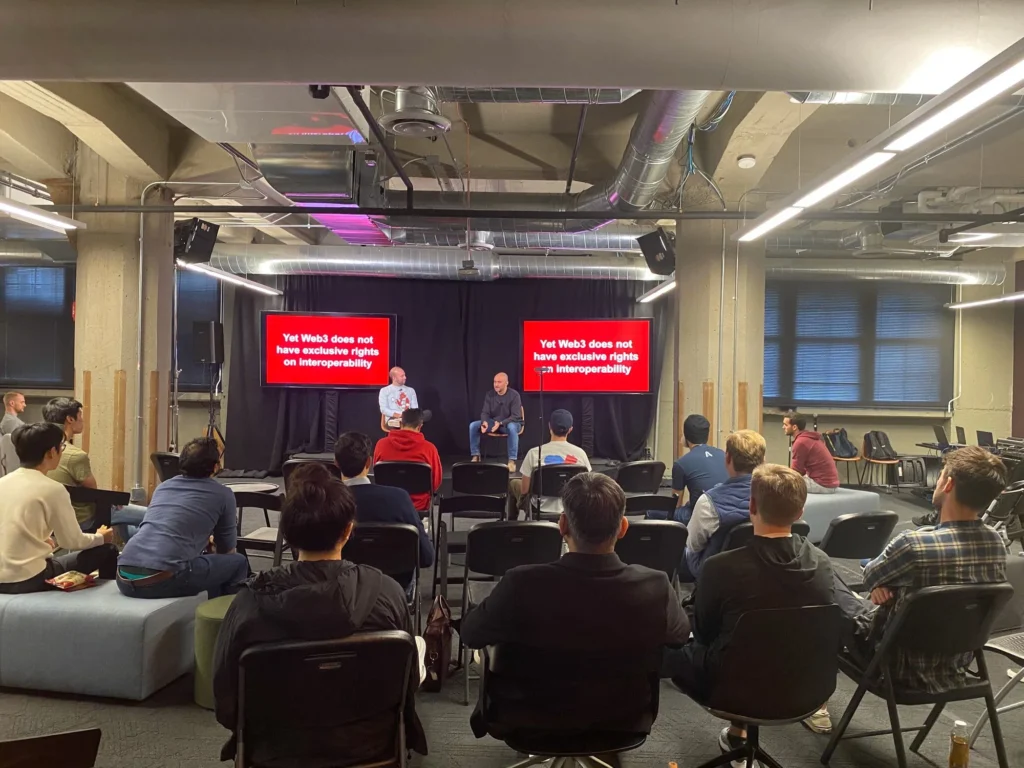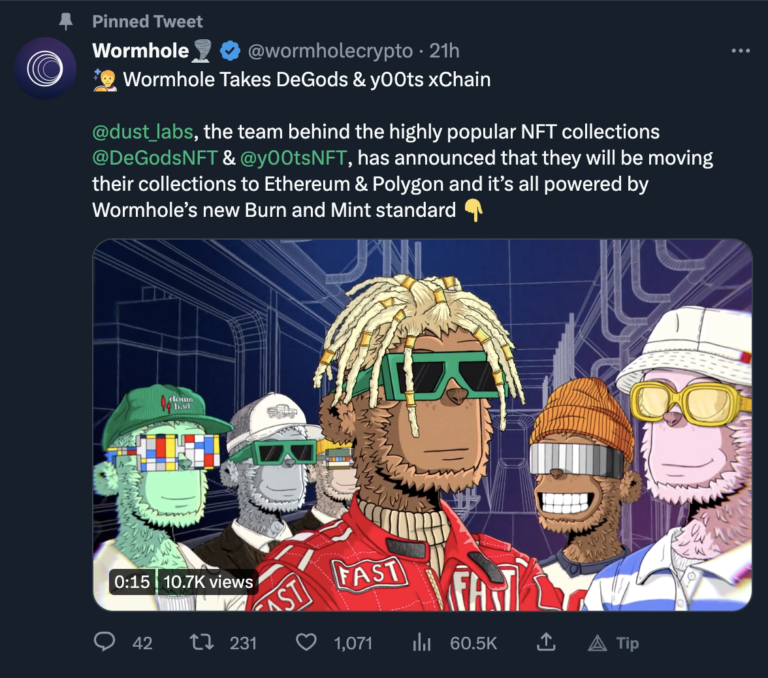
Dan Moriarty and Gene Rapoport talking Web3 and the Sports industry with Wormhole Hackathon Attendees
Prior to streaming services like Spotify, many users were familiar with Napster and Limewire which were “Peer to Peer” file sharing systems (P2P Networks). Your average user was deeply enjoying the technical benefits of P2P networks without ever truly understanding what was happening on the backend.
Fast forward to today where we’ve spent the last two years shoving the “NFT” acronym down peoples’ throats, yup “Non-Fungible Tokens”. I’ve been in tech over a decade and have never once used the word “fungible”, yet the very first question people have is “What exactly IS an NFT, and what does it even mean?”. I don’t care how deeply you understand the tech, or how abstractly you can explain it, you can’t really explain the true essence of an “NFT” without taking the person down a seemingly tinfoil-hat discussion of decentralization, data ownership, and a bunch of other technical topics that the vast majority of society simply don’t give a fxck about.
That brings me to my main purpose of this write up which is that I believe we as an industry have to rethink the messaging of web3. From the aggressive shaming of centralization, the mocking of “normies”, and the inherent slowing of growth by being a “maxi” of certain chains.
Being where we are isn’t surprising since the very ethos of blockchain was birthed from the ideas of censorship resistance, data ownership, and banking the unbanked through decentralization. However we now find ourselves at a crossroads between the satoshi/vitalik vision, and the practical needs and desires of society today. The entire blockchain(web3) community needs to come to grips with the reality that the current desires of society have very little to do with complete decentralization, and sadly ownership even if that is from a lack of knowledge on the topic.
Brett Harrison is an advisor at FTX.us and gave a discussion at wormhole’s multi-chain hackathon. He was providing insight into the current state of exchanges today, what their concerns are, and where he believes the industry will be in the coming years. He made a point that the future is a combination of centralization and decentralization, and I couldn’t agree with him more. Do I believe people should have control over their own money, be able to get loans without predatory bank policies, and be able to send their own funds across the globe without having to deal with obnoxious central banking red-tape? Absolutely, but one must understand you’re now looking to fundamentally circumvent the control of your government and/or central bank, and you’d be foolish to believe they would green light such a development without a fight, fud, and semi-control.
“Not your keys, not your crypto” is a phrase beaten into the heads of crypto-enthusiasts everywhere. This was highlighted during the meltdown of 3AC, and Celsius in particular, but it moreso speaks to the immaturity of the leaders of those platforms rather than direct NEED for people to own their keys. It might be best practice and in ones best interest to own and control their funds, but in practice how practical is it really? Expecting “normies” to exercise military-grade procedures by having a hot wallet, cold storage wallet, AND safe handling of their seed phrases (private keys) is laughable. That is the equivalent of asking these same users to safely manage the encryption key pair to their mobile banking apps.
I believe we have reached a point where we have to turn our attention to building cleaner user experiences and “hiding” web3 tech rather than alphabet souping people to death and looking down on them for not knowing what INTERPLANETARY File Storage (IPFS) is. I’ve been a cyber security engineer for years and that still sounds crazy to me. Decentralized loans, one-click wallet/ID connection, and NFTs are amazing tech advancements for the new internet, but we have to deploy them in such a way where the user does not know they’re using them (à la P2P Networking via Limewire and Napster for example).
Dan Moriarty (VP of Marketing with Chicago Bulls) and Gene Rapoport (Head of Web3 at Bain and Co) were sharing some of the raw analytic data with hackathon attendees, as well as practical concerns of sports franchises. It is night and day from where crypto twitter currently believes we are. Paraphrasing an example he gave: “What happens when we put a QR code on the Jumbotron, state it’s an NFT airdrop for Bulls fans, and our non tech savvy users manages to get hacked somewhere along the process. Or if we start offering season tickets as NFTs but the owner loses their wallet access or gets social engineered out of their nft. Now what?”
I love all the giga-brain plays currently happening in the multi-chain, layer2 rollup, and ens domain space but we need some of our big brain devs to take a break from building Cross-chain Bored Ape collateralized lending with carbon-neutralizing yields to build seamless dApps that help “Sign In With Google/Facebook” processes auto-create secure wallets that ALSO come with a simplified ENS name to represent their wallet address. Alas, that’ll require more education.




